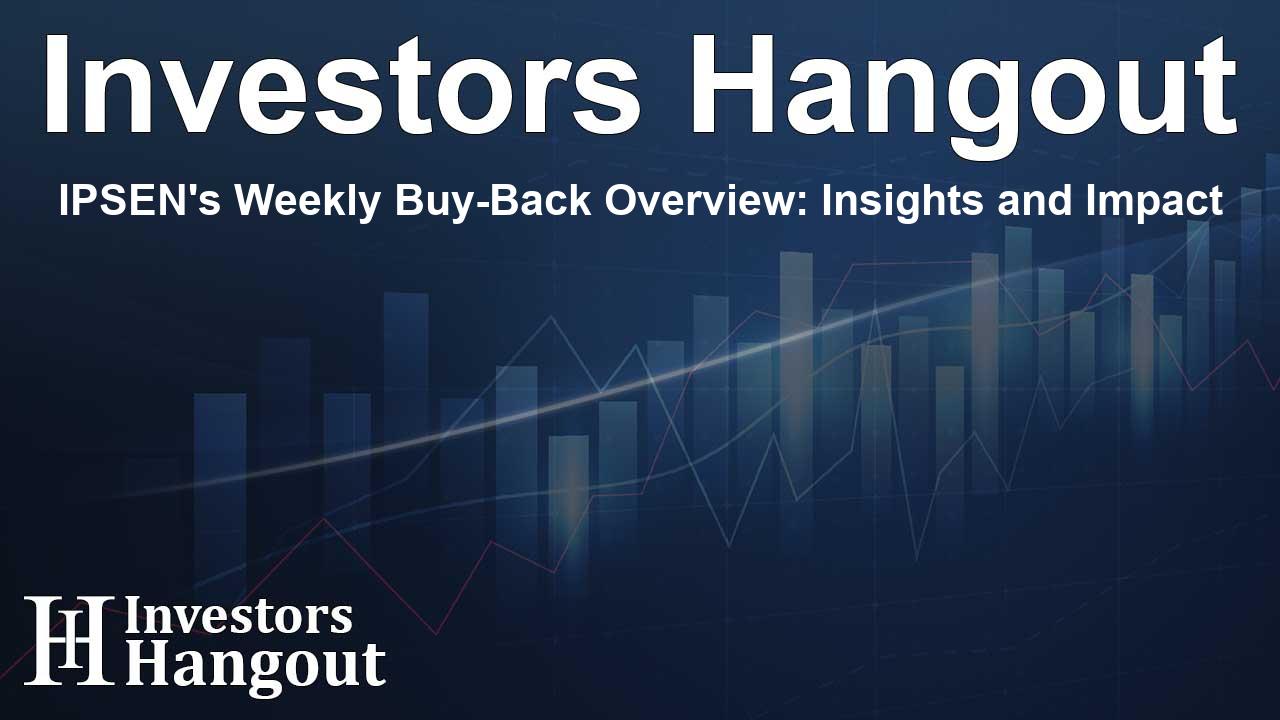IPSEN's Weekly Buy-Back Overview: Insights and Impact

IPSEN's Buy-Back Program Overview
IPSEN has been actively involved in a buy-back program, reflective of its strategic focus on enhancing shareholder value. The recent transactions took place from July 14 to July 18, showcasing the company’s commitment to its investment strategy.
Details of the Buy-Back Transactions
During the specified period, a series of transactions were executed, revealing IPSEN's methodical approach to managing its share capital. For instance, on July 14, 2025, IPSEN acquired a total of 240 shares at a daily weighted average purchase price of 105.775. The subsequent activities on the same day included additional volumes of 706 and 221 shares, with varying purchase prices, highlighting the active trading strategy employed.
Transaction Breakdown
Throughout the transaction period, IPSEN’s shares were bought on various exchanges, including AQEU, CCXE, and TQEX, indicating a diversified execution strategy. Notably, the highest single-day volume was recorded at 2,970 shares on July 14, showcasing significant interest from the market. In total, over the five days, approximately 22,329 shares were repurchased at an average price of 106.1314.
Market Reactions to IPSEN's Buy-Back Strategy
The response from investors to the buy-back program has been overwhelmingly positive. By reducing the number of shares in circulation, IPSEN aims to bolster earnings per share and provide increased value to existing shareholders. This strategy typically sends a strong signal to the market about the company’s confidence in its future performance.
Case Studies of Market Impact
Companies like IPSEN that engage in buy-back programs often report a more favorable stock performance, leading to strengthened investor sentiment. Historical data suggests that such initiatives can enhance a stock's appeal by projecting confidence in its fundamentals. With recent buy-backs, IPSEN not only aims to stabilize its stock price but also to attract long-term investments.
Future Prospects for IPSEN
Looking ahead, IPSEN is expected to continue its buy-back strategy as part of a broader commitment to shareholder returns. Continuous evaluation of market conditions will guide the timing and scale of future repurchase actions. Shareholders can expect potential updates relating to this dynamic program that might influence future evaluations of the company.
Frequently Asked Questions
What is the purpose of IPSEN's buy-back program?
The buy-back program is designed to enhance shareholder value by reducing the number of shares in circulation, which can boost earnings per share.
How many shares did IPSEN repurchase during this period?
During the week of July 14 to July 18, 2025, IPSEN repurchased a total of 22,329 shares.
What was the average purchase price of the shares bought back?
The average purchase price for the shares bought back was 106.1314.
Which markets were involved in the buy-back transactions?
IPSEN conducted transactions on multiple exchanges, including AQEU, CCXE, and TQEX.
How does a buy-back impact a company's stock price?
A buy-back can positively influence a company's stock price by increasing demand and reducing the supply of shares, leading to potential appreciation in value and improved investor confidence.
About The Author
Contact Lucas Young privately here. Or send an email with ATTN: Lucas Young as the subject to contact@investorshangout.com.
About Investors Hangout
Investors Hangout is a leading online stock forum for financial discussion and learning, offering a wide range of free tools and resources. It draws in traders of all levels, who exchange market knowledge, investigate trading tactics, and keep an eye on industry developments in real time. Featuring financial articles, stock message boards, quotes, charts, company profiles, and live news updates. Through cooperative learning and a wealth of informational resources, it helps users from novices creating their first portfolios to experts honing their techniques. Join Investors Hangout today: https://investorshangout.com/
The content of this article is based on factual, publicly available information and does not represent legal, financial, or investment advice. Investors Hangout does not offer financial advice, and the author is not a licensed financial advisor. Consult a qualified advisor before making any financial or investment decisions based on this article. This article should not be considered advice to purchase, sell, or hold any securities or other investments. If any of the material provided here is inaccurate, please contact us for corrections.
